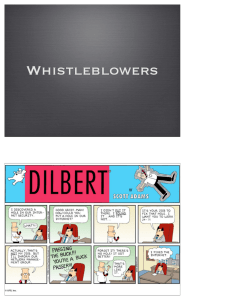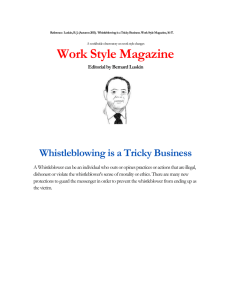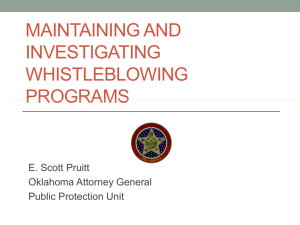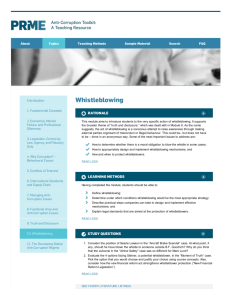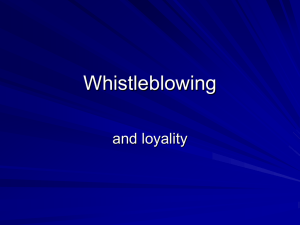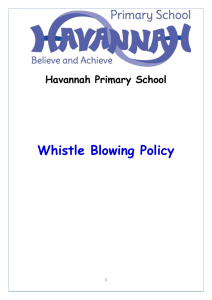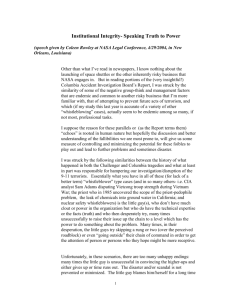Document
advertisement
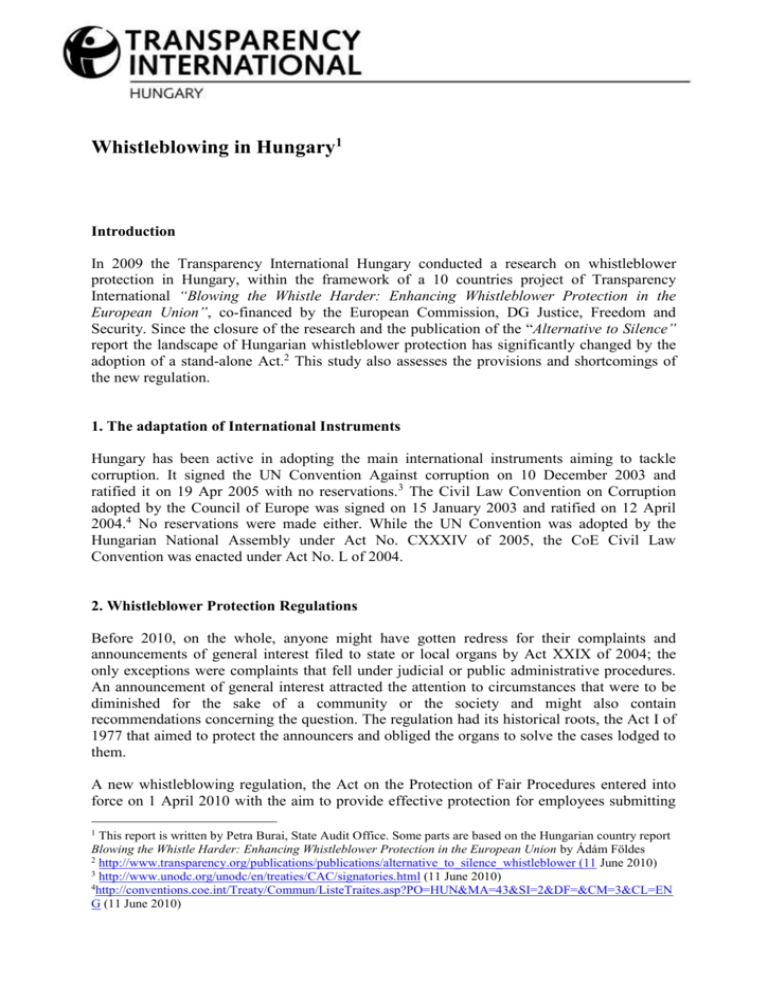
Whistleblowing in Hungary1 Introduction In 2009 the Transparency International Hungary conducted a research on whistleblower protection in Hungary, within the framework of a 10 countries project of Transparency International “Blowing the Whistle Harder: Enhancing Whistleblower Protection in the European Union”, co-financed by the European Commission, DG Justice, Freedom and Security. Since the closure of the research and the publication of the “Alternative to Silence” report the landscape of Hungarian whistleblower protection has significantly changed by the adoption of a stand-alone Act.2 This study also assesses the provisions and shortcomings of the new regulation. 1. The adaptation of International Instruments Hungary has been active in adopting the main international instruments aiming to tackle corruption. It signed the UN Convention Against corruption on 10 December 2003 and ratified it on 19 Apr 2005 with no reservations.3 The Civil Law Convention on Corruption adopted by the Council of Europe was signed on 15 January 2003 and ratified on 12 April 2004.4 No reservations were made either. While the UN Convention was adopted by the Hungarian National Assembly under Act No. CXXXIV of 2005, the CoE Civil Law Convention was enacted under Act No. L of 2004. 2. Whistleblower Protection Regulations Before 2010, on the whole, anyone might have gotten redress for their complaints and announcements of general interest filed to state or local organs by Act XXIX of 2004; the only exceptions were complaints that fell under judicial or public administrative procedures. An announcement of general interest attracted the attention to circumstances that were to be diminished for the sake of a community or the society and might also contain recommendations concerning the question. The regulation had its historical roots, the Act I of 1977 that aimed to protect the announcers and obliged the organs to solve the cases lodged to them. A new whistleblowing regulation, the Act on the Protection of Fair Procedures entered into force on 1 April 2010 with the aim to provide effective protection for employees submitting 1 This report is written by Petra Burai, State Audit Office. Some parts are based on the Hungarian country report Blowing the Whistle Harder: Enhancing Whistleblower Protection in the European Union by Ádám Földes 2 http://www.transparency.org/publications/publications/alternative_to_silence_whistleblower (11 June 2010) 3 http://www.unodc.org/unodc/en/treaties/CAC/signatories.html (11 June 2010) 4 http://conventions.coe.int/Treaty/Commun/ListeTraites.asp?PO=HUN&MA=43&SI=2&DF=&CM=3&CL=EN G (11 June 2010) information about violations of public interest.5 As to the original governmental goals the Act was accompanied by another act aiming to set up an institution called the ‘Public Interest Protection Office’ to handle procedures deriving from breaches of fair procedures and coordinate a comprehensive anti-corruption policy in general.6 The establishment of the office was heavily criticized by both parliamentary opposition parties, the parliamentary commissioner for civil rights7 and non-governmental organizations8. However, the President of the Republic vetoed the law on various grounds and it eventually never came into force. Consequently, now the Act on the Protection of Fair Procedures stands alone with no established institutional background to provide the protection guaranteed in the law, neither is any sign of willingness shown to enforce it in practice. It has to be noted, that there is no single anti-corruption Act in Hungary. The above two acts were planned to be introduced as a comprehensive ‘Anti-corruption package’. The governmental initiative failed, while the new government – as of May 2010 – formed by the Hungarian Civic Union (Fidesz) and Christian Democratic People’s Party (KDNP) has no intention to adopt new legal instruments but rather plans to further the existing legal and institutional framework.9 3. Relevant Laws and Regulations There are no special provisions on whistleblowing in the Labour Code, though there are some very general rules, which may foster reporting and provide some protection to whistleblowers. The law prescribes with regard to reporting that “in the course of exercising rights and fulfilling obligations, employers, works councils, trade unions and employees shall act in the manner required by good faith and fairness, and they shall be obliged to cooperate with one another”. The employee shall also inform the employer concerning all facts and conditions, and any changes therein, which are of importance from the point of view of exercising rights and fulfilling obligations.10 The law also provides for “exercise of rights shall be construed improper if such is intended for or leads to the injury of the rightful interests of others, restrictions on the assertion of their interests, harassment, or the suppression of their opinion”. According to the Labour Code: “the employee shall not be obliged to follow instructions if such would violate a legal regulation or a regulation pertaining to employment. If carrying out an instruction could result in damage and the employee is aware of such possibility, it shall be pointed out to the person issuing the instruction. In such a case however, compliance may not be refused” and “employees shall refuse compliance with an instruction if it would result in direct and grave risk to the life, physical integrity or health of others”. Although there are no explicit provisions on the way of reporting such illegalities, still, these sections of the law may instruct employees how to act when one is aware of wrongdoing. 3.1. Rejection of Orders 5 Act No. CLXVIII of 2009 on the protection of fair procedure and its related amendments to acts. http://index.hu/belfold/2009/10/25/bajnai_korrupcio_ellenes_csomagot_jelentett_be/ (11 June 2010) 7 http://www.obh.hu/allam/aktualis/htm/kozlemeny20090325.htm (11 June 2010) 8 http://www.transparency.hu/hirek_esemenyek?nid=424&PHPSESSID=8cc9a4e5ef7110bba11d317b2219c5ec (11 June 2010) 9 http://www.fidesz.hu/index.php?Cikk=151335 (11 June 2010) 10 Section 3 of Act XXII of 1992 on the Labour Code, see at: http://www2.ohchr.org/english/bodies/cescr/docs/E.C.12.HUN.3-Annex4.pdf (11 June 2010) 6 2 The Labour Code is lex generalis to the Civil Servants Act. “The Public Official is obliged to perform his duties in the public interest and in accordance with the law decisions of the governing body, in a professional, impartial and just manner, in line with the rules of administration of a high standard”.11 The Act also contains similar rules to the Labour Code on following instructions and refusing to comply with illegal instructions. There is a major difference in this issue: the employee “shall refuse compliance with an instruction if it would result in direct and grave risk to the life, physical integrity or health of others”, whereas the public official “may refuse” compliance in these cases as well as if the instruction is contrary to the law.12 Public Officials are also bound by their superiors’ instructions, but shall call attention of the superior and may ask for written instruction if it is contrary to the law or its performance may cause harm and the public official might be sanctioned or would be detrimental to the legitimate interests of the individuals concerned. The superior shall not refuse to give instructions in writing and the public official shall not be disadvantaged for asking written instructions.13 3.2. Obligation to Report As to § 255/B of the Criminal Code public office holders – including civil servants – who fail to report a yet undisclosed bribery are to be punished. The situation is rather controversial, since this obligation and the absence of a reporting culture is likely to result in overreporting about all alleged violations of law as it was noted by Council of Europe’s GRECO in its evaluation on Hungary.14 3.3. Protective Measures Witness protection is regulated by the Witness Protection Act and by the Criminal Procedure Act. Protection is provided to individuals during and after criminal procedures in cases of serious crimes, such as those related to organised crime, international crime or concerning terrorism, blackmailing, money laundering, drugs or arms trade, prostitution, paedophilia or crimes against life or limb. There is a wide range of measures which can be applied so as to protect the life, limb and personal freedom of co-operating persons, such as personal protection, change of residence, ban of providing personal data from registers, change of name, change of identity and participation in international cooperation. Though there are cases where these measures may protect whistleblowers, the law focuses mainly on most serious crimes which rarely coincide with less severe wrongdoings which typically would be reported by whistleblowers. In addition to the obligations imposed by international instruments such as United Nations Convention against Corruption and the Council of Europe Criminal Law Convention on Corruption in Hungary, some whistleblowers protection provisions are found sporadically, but not systematically in the Hungarian legal system. 11 Article 37 of Act XXIII of 1992 on the legal status of public officials Article 38 para (3) of Act XXIII of 1992 on the legal status of public officials 13 Article 38 para (4) of Act XXIII of 1992 on the legal status of public officials 14 Second evaluation round – Evaluation report on Hungary (2006) Council of Europe/GRECO, http://www.coe.int/t/dg1/greco/evaluations/round2/GrecoEval2(2005)5_Hungary_EN.pdf (11 June 2010) 12 3 The Criminal Code contains a provision on ”Persecution of a Conveyor of an Announcement of Public Concern” which stipulates “the person who takes a disadvantageous measure against the announcer because of an announcement of public concern, commits a misdemeanour, and shall be punishable with imprisonment of up to one year, labour in the public interest, or fine”.15 For all Purposes this is a dormant provision because since 2004 there was only one case (in 2008) in which this provision was used.16 The basis of the criminal provision can be found in the Act XXIX of 2004, which amended more than seventy acts, and also includes legal provisions on right to petition originated from the late seventies.17 The Equal Treatment Act provides protection against negative discrimination based on “any other status, characteristic feature or attribute (hereinafter collectively: characteristics)”, however this interpretation may not be accepted in practice, as this characteristic is based on the decision of the person and cannot be considered as a constant attribute.18 Pertaining to national security, “if the members of the national security services notice that the services operate unlawfully, they may report their observation in writing to the Minister. The Minister shall conduct an inquiry based on the report, and shall inform the Committee [of the Parliament] and the person submitting the report about the ordering of the inquiry and the findings thereof”.19 There is a public interest reporting mechanism for environmental issues, which report must be investigated environmental authorities.20 Policemen are required to report to their superior, but have the right to file their applications, or complaints to the minister if following the administrative rules. There are explicit rules protecting policemen against retaliation in cases of filing applications or complaints.21 The Labour Safety Act has very detailed rules on reporting health and safety risks, on the follow-up of the report and on protection of the whistleblowers.22 The Act on Public Finance and its executive regulations prescribe the establishment of internal audit department at nearly every public body. 23 However the internal auditors’ scope of responsibility does not always include a role in whistleblowing systems even if there is such system. The same shortcoming characterises the internal audit offices of many companies. There is no information on whether such personnel are sufficiently resourced, but it is common both in public and private sector that the internal auditor is responsible to and dependent on the head of the agency/company, which is problematic if the whistleblower reports on high level wrongdoing. 3.4. Prevention of Public Disclosures 15 Section 257 of Act IV of 1978 on the Criminal Code, see at: http://viso.jrc.ec.europa.eu/contaminated_lands/legislation/HungaryCriminalCode.doc (11 June 2010) 16 Information provided by the Statistical Department of the Ministry of Justice and Law Enforcement 17 Act I of 1977 on public interest reporting, proposals and complaints 18 Article 8 of Act CXXV of 2003 on Equal Treatment and Promotion of Equal Opportunities, see at: http://www.egyenlobanasmod.hu/data/SZMM094B.pdf (11 June 2010) 19 Section 27 para 4 of Act CXXV of 1995 on the National Security Services 20 Article 35 of the Government Order 347/2006 (XII. 23.) Korm. on the selection of organs responsible for tasks related to environment protection, nature protection and water issues 21 Article 117 of the Regulation No. 62/2007 of the Hungarian Ministry of Justice and Law Enforcement (IRM) on Official Instructions of the Police 22 Article 54, para 7 point e), Article 59 para 2, Article 62 and Article 68 para 1 of Act XCIII of 1993 on Labour Safety 23 Act XXXVIII of 1992 on Public Finance 4 The Labour Code prescribes the protection of business secrets of the employer24; the Civil Servants Act prescribes protection of classified information, of which details are regulated by the Act CLV of 2009 on protection of classified information. 25 This is reinforced by the Criminal Code, which penalises all forms of unauthorised disclosure of classified information regardless of confidentiality obligations. The only exception is the negligent behaviour of persons not bound confidentiality obligations. Furthermore there are numerous sectorial provisions on insurance secrets, banking secrets and other professional secrets. 4. The Current Whistleblowing Legislation – Characteristics and Features As described above the 2010 Act on the Protection of Fair Procedures was aimed to provide protection against workplace retaliation for both private and public sector whistleblowers. By entering into force without a well-established institutional background there is hardly any proof or chance of its enforcement in practice. However, as its regulations are to be applied the following description of the characteristics of whistleblowing refers to measures contained by the Act. According to the Act the whistleblower shall not suffer any direct or indirect detrimental consequences because of his report. The Act covers breaches of fair procedure occurring while spending public money, administrative actions, public procurement, measures concerning the utilization and alienation of state property.26 The Act highlights – not exclusively – the following areas of protection:27 legal conditions of employment trainings and education related to employment setting working conditions and performance criteria setting and ensuring wage and other allowances performance evaluation and career opportunities disciplinary measures and damages offer from the employer to change position termination of employment Reports might be submitted to the employer, the supervisory body or oversight institution of the employer, a (specialized anti-corruption) office assigned in a different act (in theory that would have been the Public Interest Protection Office), or the organization assigned by the employer in the organisational regulations concerning the whistleblowing procedure. 28 The confidentiality of the personal data of the whistleblower shall be ensured, though the Act only refers to the case when the investigation is proceeded by the (specialized anti-corruption) office.29 The whistleblower shall also be notified about each step and measure taken in relation to his report.30 There are no regulations on the option of turning to the media in the Act. Whistleblowers of bad faith might even be punished with a fine for their malicious reports.31 The investigation has to be conducted suitably and shall have no detrimental effects 24 Article 103 para 3 of Act XXII of 1992 on the Labour Code Article 37 para 2 and 3 of Act XXIII of 1992 on Civil Servant 26 Article 1 para 3 of Act CLXIII of 2009 on the Protection of Fair Procedures 27 Article 22 para 1 of Act CLXIII of 2009 on the Protection of Fair Procedures 28 Article 20 para 1 of Act CLXIII of 2009 on the Protection of Fair Procedures 29 Article 8 para 3 of Act CLXIII of 2009 on the Protection of Fair Procedures 30 Article 8 para 2 of Act CLXIII of 2009 on the Protection of Fair Procedures 31 Article 15 para 1 of Act CLXIII of 2009 on the Protection of Fair Procedures 25 5 on the employee. In case of a legal trial the burden of proof is reversed, the employer has to prove that his measures had no detrimental effects on the employee or the report was of bad faith.32 On the other hand, blowing the whistle does not mean exemption from other legal obligations of turning to criminal authorities or taking different measures.33 During the investigation protection is provided (again, by the yet unestablished specialized anti-corruption office), if the employee had suffered detrimental consequences by his employer beforehand or it is likely that he is going to. Protection shall also be provided for his close relatives if an organisation or a person other than the employer causes harm. Upon the employee’s request legal advice, representation and financial support is offered, the latter would depend on the decision of the investigating specialized anti-corruption.34 The employee might also be awarded, if the investigation conducted establishes that the organization concerned has breached the requirements on fair procedure.35 5. Hotlines and Other Reporting Channels In general reporting can be made at any investigating authority (police, prosecutor’s office, customs, etc.) and if they are not competent, the case shall be forwarded to the appropriate organization. If the report is rejected by the authorities or the investigation has come to an end, the ‘whistleblower’ shall be notified accordingly. There is a Telephone Witness Programme, set up in 2001, and operated by the Crime Prevention Department of the National Police Headquarters, which took the British Crimestoppers as an example.36 The hotline receives reports on any type of crime, the individuals do not have to identify themselves and their phone numbers are not recorded. The hotline receive approximately 10,000 calls a year, but only 10-15% is relevant for criminal investigation or crime prevention. Though an order of the national police chief prescribes that reports from anonymous sources on corruption shall be handled with special care so as to check its veracity. Unfortunately no statistics are created on corruption reports, they are handled together with crimes against property cases.37 In 2007 the National Development Agency, responsible for managing EU funds received within the framework of National Development Plan set up a website (www.anti-lop.hu) for reporting abuses of EU funds provided to development projects. 38 Reports can be submitted anonymously with the ability to track procedures initiated by reports, through the website. In the first two months 206 abuses were reported concerning projects of 508,8 million HUF value paid to applicants with 95 million HUF being recovered. Abuses in these cases did not necessarily mean crimes because it also covered administrative errors. Additionally, 508,8 million is only 0,2 per cent of the total distributed for development projects in 2007. Since early 2008 no statistics are published on the functioning of the website.39 32 Article 22 para 2 of Act CLXIII of 2009 on the Protection of Fair Procedures Article 21 para 4 of Act CLXIII of 2009 on the Protection of Fair Procedures 34 Article 23 of Act CLXIII of 2009 on the Protection of Fair Procedures 35 Article 16 of Act CLXIII of 2009 on the Protection of Fair Procedures 36 http://www.police.hu/megelozes/telefontanu (11 June 2010) 37 36/2008. (OT 19.) ORFK Order unified handling of public interest petitions, complaints and reports and on complaints against the police 38 Anti-lop is a word play, it means if translated literally anti-theft, but antilop means the animal antelope. 39 http://www.origo.hu/itthon/20080115-508-millio-forint-unios-palyazati-penzt-erint-a-szabalytalansag.html (11 June 2010) 33 6 There are no statistics collected by any public body or research institution on reporting or on retaliations against whistleblowers, researches on the practice in this field are also missing. The state funds saved thanks to whistleblowing are not assessed either, besides the first months of the performance of the www.anti-lop.hu website. One might also turn for help to Central Office of Justice and its county level organizational units. The employees of the justice offices serve as legal assistance service and give advice in simpler cases. The Protection Service of Police Organs is authorised to uncover and prevent corruption and other crimes committed by members or employees of the following bodies: police, prosecutor’s office, customs office, fire departments, disaster prevention, prison services and their ministerial supervisory bodies, reports on wrongdoings may be directed to them. The same time the task of criminal prosecution lies with the prosecutor’s office From April 2010 in specific cases and upon certain conditions those submitting indispensable information about so-called hardcore cartels might be entitled to an award. Since cartels often operate in secret, collaborations are difficult to discover. Information about cartels shall be submitted to the Cartel Section of the Hungarian Competition Authority (GVH), where inquiries can be made – even without the disclosure of personal identity – about whether the information is capable of paying an award. 40 6. Codes of Conduct The Parliament adopted its Decree No. 105/2009. (XII.21.) on the fundamental ethical requirements of the public sector. Though it has no obligatory power, it sets the direction for public organisations and tasks for certain institutions. The decree emphasizes that ethical requirements shall complement legal obligations, hence lays down the basic principles that shall be enshrined by public sector codes of conduct. It prohibits inter alia the acceptance of advantages (except for small value gifts with no influential impact), suggests introducing stricter regulations concerning conflicts of interests in specific organizations and prescribes setting up appropriate channels so that reports are surely forwarded to the investigative authorities concerned.41 Some of the most important public sector institutions as the National Council of Justice, the State Audit Office, Public Prosecutor, the government, the Hungarian National Bank were called upon to adopt codes of conducts.42 Meanwhile associations and interest groups of local governments were requested to implement the above ethical principles and ‘minimum requirements’.43 The reactions to the decree were diverse. Codes have already been adopted before the decree (as in case of the courts and the National Bank) but no information was provided about their revision, the State Audit Office have revised its code as requested (though it still needs to be passed), while the Public Prosecutor’s Office code was not published at all.44 40 http://www.gvh.hu/domain2/files/modules/module25/126697FD988241BF0.pdf (11 June 2010) Article 1 of the Parliament Decree No. 105/2009. (XII.21.) on the fundamental ethical requirements 42 Article 2 of the Parliament Decree No. 105/2009. (XII.21.) on the fundamental ethical requirements 43 Article 3 of the Parliament Decree No. 105/2009. (XII.21.) on the fundamental ethical requirements 44 http://atlacco.blog.hu/2010/03/02/tiszti_becsuletkodex (11 June 2010) 41 7 MOL Group which is the biggest Hungarian Company (based on turnover in 2008) makes it an obligation of its employees to report any suspicion of the violation the Code of Ethics.45 “You must report any breaches or potential breaches of MOL Group Code of Ethics, of which you become aware – whether these relate to yourself, direct reports, supervisors or others. You must similarly seek advice if you are ever unsure about a proper course of action”. The same time an Ethics Council and a hotline to them. The company also foresees “MOL Group will not tolerate retaliation against that person [whistleblower]. Allegations of retaliation will be investigated and appropriate action taken”.46 Their Annual Report of 2009 mentions 8 notifications, 6 investigations were conducted and in 4 cases were ethical misconducts47 proven. E.ON Földgáz Trade Zrt. the third biggest company in Hungary (based on turnover in 2008). By its Code of Conduct an Ethical Committee is established which receives and investigates reports on misconducts.48 On their website no information was available on the functioning of the reporting mechanisms. General Electric is the eighth biggest company in Hungary (based on turnover in 2008) applies its international Code of Conduct in Hungary.49 The document emphasises “a leader must: create a culture of compliance in which employees understand their responsibilities and feel comfortable raising concerns without fear of retaliation;” and the employees are advised “Promptly raise any concerns about potential violations of any GE policy. Understand the different channels for raising integrity concerns: ombudsperson, manager, GE lawyer, GE auditor or other compliance resource”. GE set up an “ombudsperson process that serves as a mechanism for individuals to ask questions and report integrity concerns without fear of retaliation”. On their website detailed statistics on investigations and sanctions legal and ethical violations can be found summarised on international level.50 7. Public Interest Litigation In the last ten years there have been very few whistleblower cases in Hungary. However, there have been three cases in which the court examined the notion of public interest reporting and found that one of the parties reference to these provision was unfounded.51 In a civil defamation case the court discussed the relationship of public interest reporting and freedom 45 HVG Top 500, at: http://hvg.hu/gazdasag/20100120_top_500_legnagyobb_arbevetel_lista_hvg (22 June 2010) 46 http://www.mol.hu/en/about_mol/our_company/managing_the_corporation/vision_and_values/code_of_ethics/ 47 MOL Plc's Annual Report 2009, p.106, at: http://www.mol.hu/repository/566940.pdf (22 June 2010) 48 http://www.eon-foldgaz-trade.com/cps/rde/xbcr/SID-59EF2B83-D6453C92/eon-foldgaztrade/FoldgazTrade_EtikaiKodex.pdf (22 June 2010) 49 The Spirit and the Letter, at: http://www.ge.com/files_citizenship/pdf/TheSpirit&TheLetter.pdf (22 June 2010) 50 http://www.ge.com/company/governance/ombudsperson_process/index.html (22 June 2010) 51 The practices of the judiciary were examined by researching two databases and a legal journal called Court Decisions. The journal publishes summaries of court cases of interest, selected by senior judges. The selection of cases goes back decades and is widely used by legal professionals. It is worthwhile to note that it has considerable influence on the practice of judges even if there is no precedent law in Hungary. The final source was the online database of court decisions, which encompasses all cases in which the Supreme Court or the Regional Appellate Courts took decisions. EBH 1999. 4; Metropolitan Court 20.K.33.766/2005/5.; Supreme Court Kfv.II.39.321/2006/8 8 of expression.52 In another case public interest reporting was used as an excuse against disciplinary measures, but the court refused the arguments of the employee.53 There are only two legitimate whistleblower court cases in which whistleblowers met reprisals, and the court decided on labour law claims. In the first case, three plaintiffs, former employees of a waste water management company along with sixteen colleagues initiated a court procedure against their former employer and demanded a court declaration that their extraordinary dismissal was contrary to the law, claiming salaries due for the period of unlawful dismissal, a payment instead of reinstatement, severance pay, etc. The former employees turned to the mayor of the city, complaining about their low salaries. At the same time they the mayor that as instructed by their superior they had to dump the waste material and waste water into the river as the waste management containers had been full for seven years. They also gave an interview to a commercial television channel on the same issue. The defendant claimed that the employees tarnished the good reputation of the company, and their superior, and violated business secrets. However he did not claimed that the allegations were unfounded. The court found among others that even if the opinions of the employees were sharp, it cannot be regarded as a false public interest reporting, regardless of potential information finding that the employees concerned did not fulfil their duties according to the instruction of the superior and to the professional standards. The court invalidated the dismissals and a criminal procedure was initiated against the superior for damaging the environment.54 In the second case, an employer terminated the professional relationship with an individual who had prepared an estimation and expert opinion of the distance heating costs, which were estimated in a way unfavourable to the citizens and additionally that the debts of some users were also calculated into the costs. The plaintiff sent his estimation and expert opinion to the mayor and to two members of the local council, to raise their attention to this issue. The employer terminated the employment relationship of the plaintiff by extraordinary dismissal, alleging that the plaintiff intended to damage the legitimate economic interests of the company and disclosed information to third persons without authorisation. The court found that the interests of the company to uphold this estimation were not legitimate. Furthermore, this was also proved by the fact that the method of estimation was changed after this report. It was a public interest reporting to persons (members of the local council and the mayor) whose duty is to deal with cases of public interest. The Supreme Court held that the extraordinary dismissal was unlawful and ordered a new procedure regarding compensation.55 8. Notoriety of Whistleblowing In the Hungarian language there is no exactly matching literal translation or term that would reflect the meaning and substance of whistleblowing as an anti-corruption policy measure. Whistleblowers are rarely apparent in Hungarian public life, at the same time there is no specific research on the public attitude or media analysis in this field. The only research available is prepared by PricewaterhouseCoopers, which mentions that 17% of economic crimes were discovered through whistleblowing. This is the second most 52 BH 1999. 155. BH 1999. 88. 54 BH 2003. 344 55 BH 2002. 31. 53 9 important form of fraud detection (if ignoring accidental discovery). This percentage shows a rise from 13% in 2005. The report also adds that “from our 2007 survey, the number of companies that have introduced whistleblowing programmes has increased by 10 percentage points to 31% when compared to 2005, which seems to have started bearing fruit. In fact, in terms of the detection of economic crime, whistleblowing in Hungary has been something of a success story, and it now exceeds the 2007 global (8%) and CEE (10%) figures for fraud detection.”56 Upon an analysis of press coverage about corruption Transparency International Hungary and the BCE Corruption Research Center reported that in 57% of the articles examined between 1 January 2006 and 31 December 2007 the person thanks to whom the cases came to light was not mentioned at all. It is certainly unclear whether the lacking resources or the ‘nonnewsworthiness’ was the reason for the silence but it shows that whistleblowing is usually hardly an issue in the public debate.57 Table 1 Person making the case become public 4 3 9 14 16 61 107 The corrupted person A colleague of the corrupted person The corrupting person A rival of the corrupting person Others Not identifiable in the article Total (BCE Korrupciókutató-központ, Transparency International Hungary, 2008, n=107) Only recently – along with the failed governmental anti-corruption package and the Transparency International Hungary’s aim to raise the question onto the policy agenda – have there been initiatives to introduce whistleblowing as a widely accepted term and measure against corruption. The current Act uses the expression ‘disclosure of public interest’, however, there is no evidence that either the public or the press has accepted and started to use that legal term. In the case of whistleblowing it usually takes wide social recognition, and hence significant amount of time until the phenomenon gains its own name. From a linguistic point of view, Hungary yet seems to be in that evolutionary phase. 9. Attitude Towards Whistleblowing in the Press and of Society Empirical evidence on whistleblowing in Hungary is very limited; therefore any conclusion on the current situation could only be drawn indirectly. According to recent surveys the Hungarian society in general shows signs of confusion as far as reporting corruption is concerned. Table 2 56 Economic crime: people, culture & controls, The 4th biennial Global Economic Crime Survey, Hungarian country report, see at http://www.pwc.com/en_HU/hu/publications/assets/crime_survey_eng_final.pdf (11 June 2010). 77 leading companies within Hungary were interviewed on economic crime and the study also touched upon whistleblowing programs. 57 http://www.crc.uni-corvinus.hu/download/korrupcio_2009_mediaelemzes_2001_07_090310.pdf 10 NO YES Does not know or refused to answer 69% 27% 4% If you faced corruption, would you report it? 33% 30% (by giving their names) 27% (anonymously) 0% When you experienced corruption, did you report it? 94% 6% 0% If you faced corruption, would you know who to report it to? (The Gallup Organization, National Survey, 2007, n=1000) While the majority of surveyed people said they would report corruption, most of them were not sure who to turn to. Furthermore, their reported ‘civic courage’ becomes doubtful as it turns out that, in fact, only 6% of them reported experienced corruption in the past. The reasons for the refusal – according to the Gallup survey – were diverse, but mainly pointed at “fear and/or disliking the police” (11% of the participants mentioned it as a second reason), “fear of the reprisal of the public institutions” (10%, second reason) and argued that it “was not worth reporting” (8%, first reason). However, the survey made no distinctions between reporting in and out of the realm of workplaces, public and private sector, and only specified the police as the main organization to turn to (6% chose to report to other bodies, these remain unidentified in the research). Therefore the nature and scope of whistleblowing could hardly be mapped upon these data, though the survey provides evidence on the lacking awareness on the issue in the society and the missing reporting system.58 In the media the issue of whistleblowing has been discussed in two forms, there were reports of corruption scandals, in which whistleblowers had a role, but the focus was almost always on the act of corruption. The other types of articles were about the government plans on a new whistleblowers protection act. However, as it was mentioned beforehand, only a very small percent of whistleblowing cases make it to the media. The reasons are various. First, media is seen as the last legitimate resort to turn to – internal organizational channels are to be exhausted first. The whistleblowers have to have detailed evidence as well as moral reasons to leak the information to get accepted by their employer, the state authorities and the society. Second, journalists, understandably, protect their sources. In addition to the general legal restrictions concerning data protection and protecting reputation according to the Act II of 1986 on the Press the journalist can keep confidential the name of their sources upon request of the person providing information.59 The Codes of Ethics of the Hungarian Journalists National Association (MUOSZ), one of the most significant journalist organizations in Hungary, stipulates if the source was promised to keep his or her identity in secret, that promise has to be kept in all circumstances, though the origin of the information has to be published if it does not endanger the safety of the source. Upon these regulations it is the journalist to decide the fate of the source. In reality editorial choices or political influence might also intervene to keep issues off the public agenda. As 58 Anti-corruption Strategy (draft version 6.0 as of 11 June 2008). Ministry of Justice and Law Enforcement. http://www.irm.gov.hu/korrupcio_elleni_strategia/cikk/Korrupcio_Elleni_Strategia_munkaanyagoK_letoltheto.h tm (11 June 2010) 59 Article 11 para 1 c; The same provision also makes an exception the same time when it refers to criminal law rules if information relates to crimes. 11 whistleblowing scandals tend to be very sensitive with rather unambiguous outcomes journalists are often not keen on engaging in them and risking their own credibility. In other cases the sources are covered so extensively that it is hardly possible to identify that the wrongdoing came to light due the report of a whistleblower. In May 2008 disciplinary procedures were initiated against two labour inspectors after giving an interview to a commercial news channel.60 The inspectors informed the television on a corruption case in which twenty companies were on a “white list”. Following the instruction of the head of the authority, the labour inspectors could not fine these companies, even if they committed illegal acts. The investigation also found that “zero certificates” were also issued for these companies, which certified that the company was not sanctioned for any violation of labour regulations, which documents are needed for public procurement biddings. In November 2008 the head of the authority and the head of the internal audit department of the authority were arrested and in March 2009 became suspects of forgery of official documents.61 In June 2008 the military prosecutor indicted for incitement a police officer, who is also the head of a police labour union. A month later another leader of the union became suspect of incitement.62 The indicted police officers called the attention of the labour union members on their website to wrongdoings within the police. They were unable to achieve substantial changes, as they intended through court procedures. The military prosecutor considered these publications as incitement. The head of the labour union later used her reputation earned in these cases and became the fourth candidate on the list of Jobbik, the extreme right populist party for the European Parliament elections, which sent three MEPs to the European Parliament (and later has become the third strongest political power in the Hungarian Parliament). In June 2008 a series of parking control system scandals started. Nine controllers put an end to the practice of car owners paying some bribes to the controllers, which had to be shared by their superiors, so as to park for free in areas where otherwise high fees should be paid. The uncovered system was quite complex, encompassing 33 areas in Budapest, all managed by one company.63 The whistleblower who disclosed a list of 1000 car owners with registration plates and phone numbers received serious threats and was dismissed from the parking company.64 A month later wrongdoings were discovered at another parking company in Budapest, though it was not as well organised as the pervious one.65 A chief controller of the latter company reported after his dismissal, that the controllers often falsify the photos, which prove that someone parked without valid parking ticket on the street. He also stated that the controllers render the ticket machines useless to create more fines, and that the controllers take bribes, though not in an organised way. In August 2008 a bus driver of the Budapest public transport company gave an interview, in which he complained about the poor technical conditions of the buses and the infrastructure 60 http://www.hirtv.hu/belfold/?article_hid=214625 (11 June 2010) http://nol.hu/belfold/lap-20090324-20090324-48 (11 June 2010) 62 Section 357 para 1 of Criminal Code stipulates „The person who incites discontent among soldiers with the superior, an order or in general the order of service or discipline, commits a misdemeanour and shall be punishable with imprisonment of up to one year”. 63 http://www.blikk.hu/blikk_aktualis/20080620/parkolas_zsebre_akar_napi_60-80_ezret_is/ (11 June 2010) 64 http://velvet.hu/blogok/helyszinelo/2008/06/25/halalosan_megfenyegettek_a_kitalalo_parkoloort/ (11 June 2010) 65 http://www.blikk.hu/blikk_aktualis/20080705/botrany_a_centrum_parkolonal_is/ (11 June 2010) 61 12 supporting it. The driver was subsequently dismissed. However, a few days later the company reversed this decision, but initiated a disciplinary procedure. After this case they changed their policy so that no employee of the company, except the spokesperson may give interviews. In August 2008 a mill industry professional blew the whistle that a dozen major mill industry companies formed a cartel for four years, costing the public 60 billion HUF. She asked for “witness protection” from the competition authority, but it has not provided it adequately. The whistleblower received a high number of serious threats. A labour law procedure is currently pending between her and her former employer a mill industry company.66 In January 2008 the executive director of the Terézváros Asset Management Company (Terézvárosi Vagyonkezelő Zrt.) was arrested and charged upon tape recordings about suggesting paying 18 million forints as ‘slush fund’ in order to obtain the rent licence for a business property in the district.67 The entrepreneur whom he was offering to use corrupt means was called Károly Berecz, manager of a Müárt-Press Ltd. He decided to blow the whistle, turned to the police and cooperated with the authorities willingly. Berecz has never denied his role in the investigation; his full name appeared in the coverage, sometimes with additional personal information. In June 2010 it was reported that the first instance court ruled against him in a defamation case brought against him because of the alleged corruption. Furthermore, he claims to have suffered detrimental health consequences caused by the distress for being in the mire.68 10. Attitude Towards Reporting to the Police and Public Disclosure In 2002 the Ministry of Interior created a survey on public officials’ ethics, in which the public officials filled in a questionnaire. 309 questionnaire contained valid answers. The survey was anonymous and asked only about the type of the employing public body, the grade of the public official, his/her gender and age.69 One Question asked was: In your opinion, which idiom is true for the public administration if the public official experiences or suspects unethical behaviour, or a more serious deed of one of his/her colleagues or superiors? (1. point) Less said, the better. 175; (2. point) Who is silent is an accomplice of the guilty ones. (3. point) I am not allowed to tell anyone, so I tell everyone. no answer 56,7 % 93; 30,1 % 26; 8,4 % 15; 4,8 % The arguments show different dynamics in society. Experts suggest that people are more likely to bend their head and stay away from problems in Hungary. At the same time anonymous reporting is often seen very useful, because people tend to report more in this form. However, at the same time it has its own risks. Typically the individual will report what she/he believes to be important and in many cases not all the relevant information will be available. As a consequence of anonymous reporting, the individual cannot be further 66 http://index.hu/gazdasag/magyar/2009/07/01/igy_vettek_ki_a_zsebunkbol_60_milliardot/ (11 June 2010) Terézváros is the name of the 6th district of Budapest. 68 http://www.fn.hu/hetilap/20100601/korrupcio_terhe/ (11 June 2010) 69 www.kszk.gov.hu/data/cms29522/Etika_tov.kepz.progr.mell.doc (11 June 2010), there is no more information available on the sample. 67 13 questioned. Nevertheless there is difference between anonymous hotlines and e-mails, as through e-mail still there is a possibility to contact the whistleblower and preserving his/her anonymity. E-mail also helps to give feedback to the whistleblower. Otherwise one would not necessarily see the result of blowing the whistle, which does not support further cooperation. One of the main reasons for the silence about whistleblowers is deeply rooted in the history of Hungary. The country was governed by authoritarian regimes or dictatorships between 1919 and 1989 (with the exception of three years after the World War II, but still under Soviet occupation). In this period it was very common to report to the political police, which could result is very severe consequences for the reported persons and to their families, thus reporting to authorities on other people, known to the reporting individual (such as colleagues, neighbours, etc) is considered immoral and not supported by the public. However it does not mean that the reporting culture has not survived the transition. In most cases when someone reports on another person it is used as in retaliation against personal enemies i.e. for suspected tax evasion to the tax authorities. For these reasons hardly any whistleblower will ever be a national hero in Hungary as opposed to whistleblowers in the United States after the Enron case. Different segments and groups within Hungarian society have similar views regarding this issue because everybody has a relative who was reported to the Horthy-regime, or later to the arrow-cross secret police in the 1930s and 1940s or to the communist secret police from the 1950s on. It is a remarkable sign of the public attitude that the Parliamentary Commissioner for Data Protection and Freedom of Information has taken a very rigid stance on internal misconduct reporting systems. The commissioner has emphasised that “in Hungarian practice, however, the use of misconduct reporting systems involves the violation of the rights of individuals subject to data processing in the majority of cases. In some cases Hungarian employers – presumably setting the goal to be achieved aside – create reporting systems which are practically nothing but informant networks in which employees can freely press charges against each other even with respect to offences of little gravity”.70 11. NGO Activities in the Field Transparency International Hungary regards whistleblowing as a key issue in tackling corruption. TI Hungary drafted a concept paper in 2008 to promote a comprehensive policy concerning whistleblowing and participated in the legislative process by giving opinions on the governmental draft legislation.71 K-Monitor provides an online opportunity for whistleblowers visiting its website to share their information and experiences. The organisation does not require formal reports but true stories in which the whistleblowers were concerned. The information shall be capable to be proofed; therefore it is advised to submit documented evidence along with the stories.72 Sarbanes and Oxley Act. The interpretation of the law is not evident: the hotlines under Section 301 of the SOX can or could be used by subsidiaries of a company present in the 70 Annual Report of DP&FOI Commissioner 2007, pp. 61-62, see in English at: http://abiweb.obh.hu/dpc/annual_reports/ar_dpc_2007.pdf (11 June 2010) 71 http://www.transparency.hu/whistleblower (11 June 2010) 72 http://www.k-monitor.hu/index.html (11 June 2010) 14 United States. Should the subsidiary company establish such channel so the parent company will suffer no harm from the sanctions by the Securities Exchange Commission? Can an employee working outside the United States submit a report through these channels? In order to clarify these issues, we require the participants to contact at least three companies registered at the New York Stock Exchange market, and specify whether these subsidiary companies are required to comply with the Sarbanes and Oxley Act or not. If so, to what extent, and what measures were taken in order to comply with the SOX? Participants are also asked to examine whether employees at a subsidiary faced cross border jurisdictional collision because of the extraterritorial rules in the SOX. 12. Data Potection and whistleblowing system The Act LXIII of 1992 on the Protection of Personal Data and Public Access to Data of Public Interest (hereinafter: DP Act) requires several conditions for processing personal data. As the whistleblower systems are rather new no stable practice of data protection on whistleblowers and of reported persons has developed. There are two approaches present regarding the authorisation of processing personal data in order to operate whistleblowing regulation. The Data Protection Commissioner issued several statement regarding this matter in which he condemned any whistleblowing system where no consent of the employees is required who may become subject of reporting.73 Another approach is that by signing an employment contract every employee consents with all conditions, requirements set by internal regulations. The content of such regulation cannot be contrary to the law and there is no possibility to opt out. The Labour Code requires cooperation in good faith between employer and employee (see above). Reporting wrongdoings may be considered as fulfilling this requirement, thus whistleblowing can be interpreted as data processing ordered by an Act.74 In both cases reporting has a clear purpose and legal basis, namely a provision of the new whistleblower protection act which regulates reporting.75 13. Legal Reviews Hungary has a four level court system. Depending on the complexity of the case it starts on the local or the county level. In civil procedures there is ordinary appeal once in a case, in criminal procedures depending on the case once or twice. Both in civil and criminal procedures there are extraordinary remedies for the re-examination of legally-binding verdicts: the revision and the legal review.76 The revision can be used in case on a grave violation of procedural law, such as the judge committed a crime in the procedure, the case was res iudicata, etc. The legal review functions as a quasi additional ordinary remedy, but it is heard by the Supreme Court. There are two more extraordinary remedies: remedy for legality in criminal procedures and the constitutional complaint, which can be initiated before the Constitutional Court. The same rules are applicable in whistleblower cases. Ádám Liber, On legal requirements of internal whistleblowing systems [A belső visszaélés - jelentési rendszer jogi követelményeiről], 2-3, Gazdaság és Jog, 2009. 74 Article 3 para 1 b, DP Act 75 Article 20 para 1 of Act CLXIII of 2009 on the Protection of Fair Procedures 76 Chapter XIII of the Act III of 1952 on civil procedure and Chapter XVII of the Act XIX of 1998 on criminal procedure 73 15
